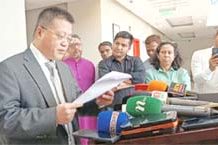C T Online Desk: The seats of the upper house of parliament will be distributed among the political parties in proportion to the votes they will secure in the national election.
The upper house of parliament will comprise 100 seats, and members will be nominated through a Proportional Representation (PR) system, National Consensus Commission reached a decision in this regard on Thursday.
That means the seats of the upper house of parliament will be distributed among the political parties in proportion to the votes they will secure in the national election.
The National Consensus Commission held an elaborate discussion on the issue and finally reached the decision, however, BNP and its like-minded political parties opposed it during the meeting.
BNP and its political partners said that the members of the upper house will be nominated based on the seats won by the political parties in the national election.
Besides, Bangladesh Jamaat-e-Islami and National Citizen Party (NCP) vested its full support in the government regarding the PR system.
The commission came up with the announcement after the 23rd meeting held at the Foreign Service Academy in Dhaka, where Ali Riaz, vice chairman of the commission, expressed his willingness to put an end to the discussion.
The PR is an electoral system that elects multiple representatives in each district in proportion to the number of people who vote for them. If one-third of voters back a political party, the party’s candidates win roughly one-third of the seats.
At last, the government is finally going to introduce the PR system in Bangladesh, ignoring the opinions of BNP and its allied political parties.
Recently, several BNP leaders claimed that those who will lose their election deposits are demanding the PR system.
Due to disunity among the parties during the discussion, the matter was at one point referred to the commission, which subsequently decided to nominate members of the upper house through the PR system.













